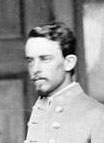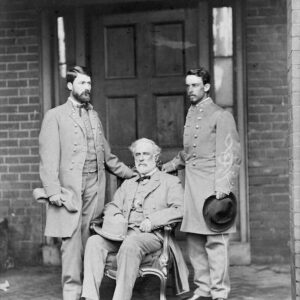Tag: Taylor (Walter H.)
 Wikipedia says: Walter Herron Taylor (June 13, 1838 – March 1, 1916) was an American banker, lawyer, soldier, politician, author, and railroad executive from Norfolk, Virginia. During the American Civil War, he fought with the Confederate States Army, became a key aide to General Robert E. Lee and rose to the rank of Colonel. After the war, Herron became a senator in the Virginia General Assembly, and attorney for the Norfolk and Western Railway and later the Virginian Railway.
Wikipedia says: Walter Herron Taylor (June 13, 1838 – March 1, 1916) was an American banker, lawyer, soldier, politician, author, and railroad executive from Norfolk, Virginia. During the American Civil War, he fought with the Confederate States Army, became a key aide to General Robert E. Lee and rose to the rank of Colonel. After the war, Herron became a senator in the Virginia General Assembly, and attorney for the Norfolk and Western Railway and later the Virginian Railway.
…After John Brown’s raid on Harpers Ferry in 1859, Taylor joined a local militia company. After Virginia voters approved secession in April 1861 during the early days of the American Civil War, Taylor joined the Confederate States Army, as did others in his militia company and his elder brother, Richard Cornelius Taylor (1835-1917; who would become a Major before the war’s end).
Walter Taylor was soon assigned to the staff of General Robert E. Lee, shortly after the General was given command of Confederate forces. Taylor became no ordinary staff officer, but effectively the chief aide-de-camp to General Lee throughout the war. Since Lee was noted for his small, over-worked staff, the exceedingly capable and tireless Taylor had many responsibilities. He wrote dispatches and orders for Lee, performed personal reconnaissance, and often carried messages in person to corps and division commanders. (He verbally transmitted the famous “if practicable” order from Lee to General Richard S. Ewell below Cemetery Hill during the Battle of Gettysburg.) Taylor greeted all people who came to see Lee, and usually decided whether they would be announced to the General. When General Lee assumed command of the Army of Northern Virginia in June 1862, during the Peninsula Campaign, Taylor became that army’s assistant adjutant general. Taylor eventually attained a rank almost commensurate with his great staff responsibilities, being promoted to lieutenant colonel on December 12, 1863.
Ltc. Taylor accompanied General Lee during the surrender at Appomattox Court House. (In postbellum writings, he is generally referred to as “colonel”, a customary abbreviated title.)
Showing the single result
